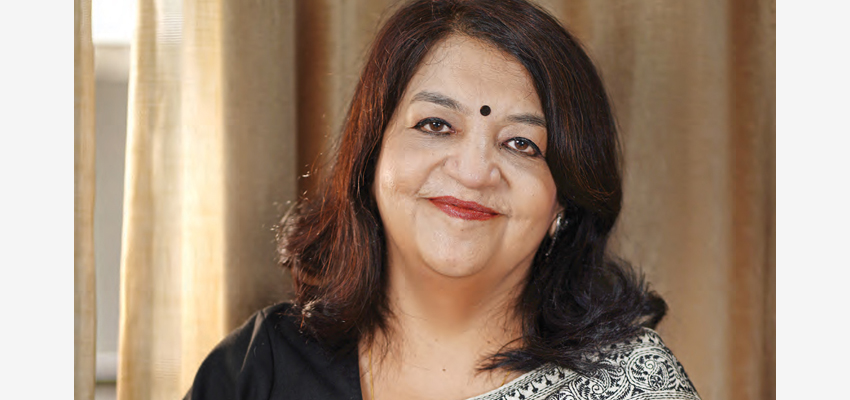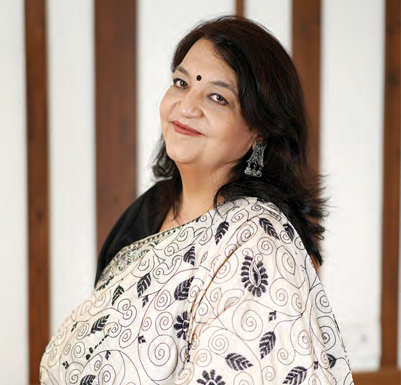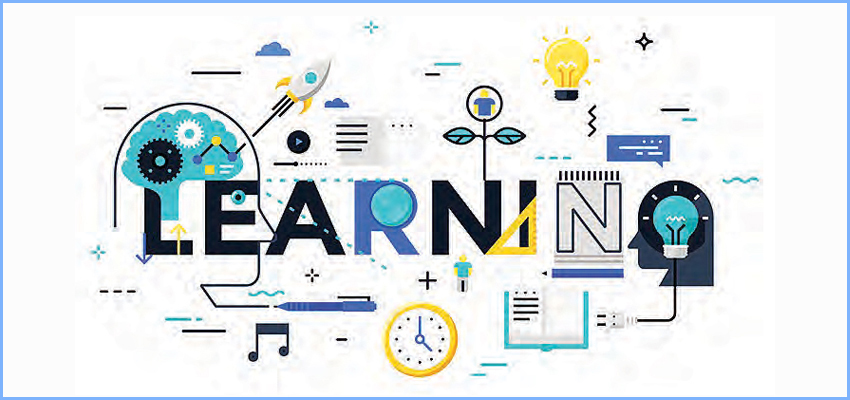BUILDING LEADERSHIP

Gone are the days when Training was a monotonous task. Today, the emphasis is not on Training but on learning. Perhaps no one knows this better than Manisha Shukla, Professor & Head, MDP at the Sri Balaji University, Pune (SBUP), who has 16 years of experience in managing and conducting training and development programmes for management professionals. She has a PhD in Management Studies from Rani Durgavati University, which she did after completing her M.B.A in Marketing & Finance from the University Institute Of Management, Jabalpur. In addition, she has also acquired an M.A in Sociology along with a B.J.C in Journalism & Mass Communication. Manisha chats with Corporate Citizen about MDP, what it takes to train future leaders, and her philosophy of life
"If we do not update ourselves in today’s VUCA environment and if we do not prepare ourselves with what is relevant, then we will be obsolete"
- Manisha Shukla
Corporate Citizen: What is the importance of MDP in today’s corporate world?
Manisha Shukla: What is the buzzword nowadays or has always been in the history of organisations? If I were to put it in simple words, it is performance. Usually, when we talk about it, we think achieving results is performance, or we think being committed is performance. However, as a manager or as part of the leadership team, it is important to understand that it is not the outcome but the factors, which impact performance that need to be taken care of. The formula that makes for an effective performance is based upon knowledge, skills, attitude and situations. Interestingly, this formula is based on the multiplication of those attributes and not the mere addition of them. Because if there is a paucity of even one of these elements or variables, the entire performance falls flat. It is so interesting to understand that knowledge, skills, and attitudes are critically important for performance.
Growth and development are interrelated. When employees join an organisation, they have certain career aspirations in mind and the most important is the growth factor.
That is why you would find different designations, which gives them a sense of achievement and identity. This is a major shift, and that is why in today’s world when the millennials are aspiring for growth, they are realising that the biggest engine for growth is knowledge and skill.
CC: Does that comprise MDP?
Yes. MDP stands for Management Development Program. All those programmes that aim at developing the skill, the knowledge and to a certain extent the attitude of the employees and managers are termed as Management Development Programs (MDP).
CC: Could you elaborate on the content of MDP?
We adopt a very holistic approach which comprises a huge canvas of management with multiple areas of specialisation, starting from strategy to general management and getting into more specific areas like HR, IT, Marketing, Operations, and Finance. Then there are super specialisations, which means within one specialised area, let us say Finance, there are subjects like Security Analysis and Portfolio Management, Managing Personal Finance and so on. If you talk about Marketing, you will find super-specialised areas in Customer-Centricity, Green Marketing and Sports Marketing. We have adopted a funnel approach-starting from the basics and making very specific tweaks as per the requirements of the organisation. If you consider HR, we have sub-topics related to Behaviour, Leadership, Succession Planning and Strategic Management. All these come under the broad umbrella of HR.
CC: Is this a programme that runs parallel to MBA or is it a separate course?
This is a certification programme. Now within Sri Balaji University Pune, we have different institutes, which offer MBA courses, like Balaji Institute of Telecom and Management (BITM), Balaji Institute of Modern Management (BIMM), Balaji Institute of International Business (BIIB) and Balaji Institute of Management and Human Resource Development (BIMHRD). Now there is a separate MDP department called SRI BUILD, which has been established within SBUP. This is an acronym, which stands for 'Sri Balaji University’s Initiative in Learning and Development’. We cater to post-graduate programmes of the MBA institutes of the SBUP. SRI BUILD also caters to the never-ending demands of corporates for learning and conducting training programmes for their employees. Hence, MDP is more like an executive education for corporate managers from every stratum.
"Today, I am using the Zoom platform extensively. A couple of years ago, I did not even know it existed. Things are constantly changing. Our department enables learners to incorporate the habit of updating and adapting themselves"

CC: How is this course conducted?
This question takes me back to the time when we were conceptualising the formats of MPD and training programs. If you broadly talk about it, there are two different kinds of programmes. One is instructor-led and the other is self-based. Currently, we are focusing on instructor-led programmes. When we talk about instructor-led programmes, again there are further two categories-open programmes and customised programmes. Consider that there is an expert in the area of Green Marketing or Customer-Centricity. We conceptualise and develop the programme revolving around that and then we invite registrations. That is an open programme. Anybody from any organisation can register. The other format is the customised one. In this, we reach out to the organisation and customise as per its needs. This programme is specific to the needs of that particular organisation. We offer these programmes both online and offline.
CC: When was SRI BUILD launched?
It started in this academic year of 2022. We started working on this in August 2021 and laid the foundation in November 2021. Ever since, we have conducted multiple open programmes on employer branding, digital marketing, strategic sourcing and supply chain management. We also had a programme on Samvad (conversation). We had hired an ICC coach Mr T Tendoy from the UK who was the coach and expert. In March, we concluded a training programme for aspiring entrepreneurs in the beauty and wellness sector.
CC: What is the duration of the programmes?
That depends on how the programme is conceptualised. There are different levels—the basic level, the intermediate level and the advanced level. If it is the basic level, it can be for as less as eight hours, two days or four days. As of now, we have been operating from two days to as much as 15 days for this level, wherein by the end of the programme, the major takeaway, apart from the knowledge and skill that they gain, is the certification that they get from SBUP.
CC: You have nearly three decades of experience in this field. What are your observations regarding the changing corporate culture?
Earlier, the term was Training and Development. Now it has changed to Learning and Development. Now, the majority of organisations are talking about Learning and Development. Earlier, the inputs were more facilitator oriented. Now, it is more learner-centric. Everything involves learning. I think it has become more of a pull than a push. What clicks with the learners is provided, leading to more interaction with the learners than ever before. The courses are highly interactive and are highly participative so when we train, we keep in mind the psyche of the adults. When you teach kids, your orientation is entirely different, and when you interact with adults, we take cognisance of the fact that we are not teachers as such, but we are facilitators. Because the participants bring their own experiences to the table. We just need to flesh that out and add on value, so that they understand the purpose, the utility and the relevance of what is happening and why it is happening.
"When we go on a journey for a vacation, we are more concerned about the destination. When we reach there, we realise that we missed the excitement of the journey. Therefore, when we say happiness is a success, enjoying the process of that journey is also part of success"

CC: Tell us about your Seven Habits of highly effective people, where you have received a certification. What are these habits?
This certification has helped me as an individual and as a good team player. It has helped me in my leadership skills, enabling the team players in my team to move forward and take forward exactly what we visualised and envisaged. We talk about being proactive and about emotional stability. In MDP, it is a boundary-spanning role. This means, we interact with multiple people, multiple clients and multiple stakeholders. Maintaining your emotional stability, and being undeterred by any situation, is extremely important. This makes you evolve not just as a leader, but also as a person.
At SRI BUILD, we are not just concentrating on MDPs, we are also concentrating on consultancy programmes. We are also into preparing our self-paced programmes. So, there are multiple things in our basket, so when we sit and prioritise, the time management, the art of prioritisation, every habit strongly aligns with MDPs' principles, which is akin to sharpening the axe. Very interestingly, if we do not update ourselves in today’s VUCA environment and if we do not prepare ourselves with what is relevant, then we will be obsolete. Today, I am using the Zoom platform extensively. A couple of years ago, I did not even know it existed. Things are constantly changing. Our department enables learners to incorporate the habit of updating and adapting themselves, believing in the philosophy that learning has no age barrier, and believing in the philosophy of age-long learning is what our department enables.
CC: You have done programs on ‘Happiness for Success’. Tell us about these programmes.
When we go on a journey for a vacation, we are more concerned about the destination. When we reach there, we realise that we missed the excitement of the journey. Therefore, when we say happiness is a success, enjoying the process of that journey is also part of success. Feeling it, managing conflicts, managing challenges and a sense of achievement that this inculcates are important. When we talk about success, it is not about what we have done, it is also about what we could not do and we should not repeat doing that. Deriving happiness, from little things, is as important.
CC: Is this part of your MDP program syllabus as well?
Yes, we have multiple programmes related to happiness, coaching and self-management. For self-management, we have conceptualised programmes from ancient Indian wisdom. We talk about learning and the feeling at the end of any interaction. For example, I am interacting with you now. Once it gets over, the feeling I get about interaction decides the nature of the experience, that may linger on. In organisational behaviour, usually, the organisations are talking about absenteeism, turnover, focusing on higher productivity, focusing on job satisfaction and so on. We are nowadays focusing on employee engagement as every organisation is now talking about it.
CC: You said you have inculcated lessons from ancient Indian wisdom. Please elaborate...
We can learn so much from the Bhagwad Gita. An employee feels a sense of belonging when he feels that his employer is taking care of him. When he feels that he is being taken care of, it is visible at the physical, mental and at intellectual level. The concept of self in the Bhagwad Gita also says so. It says that the self is made up of body, mind and intellect. A beautiful shloka in the Upanishads has compared one’s life to a person on a chariot. In this analogy, the horses are the senses, the reins are our mind, the person holding the reins is the intellect and the owner of the chariot is our aatman (consciousness). Our senses need to be controlled by our mind, our mind needs to be controlled by our intellect and our intellect needs to be controlled by aatman.
It also that an apt diet, proper sleep and the right amount of work, i.e. neither to be lazy nor to overwork yourself are important. You will be elevated if you take care of your body. When Lord Krishna says “the mind is so ‘Chanchal’ that it churns you and takes away your energy.” We often experience this phenomenon. We may be lying down on the bed and trying to relax but we are not able to relax. That is because the mind is in a state of turbulence. It is here when Krishna calls Arjuna a real warrior. He tells him that the mind is not controllable but if you continue managing your mind, you will be able to detach yourself from the results and be happy.
CC: What is your description of a successful manager in the corporate world?
Success for a corporate manager can be described by a line in the Bhagwad Gita which translates to “Yogis aligning your energy with the divine energy”. You are directing your energy for organisational happiness, organisational growth, your personal satisfaction, and last but not the least, social happiness. When you talk about an individual, he or she is an entity in his/her own right but is also part of a team that makes the organisation, which in turn, contributes to society. When this entire picture is interconnected and when we believe in co-existence, the entire society is going to grow and flourish together.
CC: You have so many qualifications. It’s rare for an academician.
I was earlier associated with SBS. I very strongly align with Bala Sir’s vision. I believe his vision strongly aligns with what I feel is the purpose of my life.
CC: What is the philosophy of your life?
Life is beautiful. Keep smiling and keep spreading love. I feel blessed to be an academician. Every day is a festival of learning. Learning is food for the heart, mind and soul. Keep learning and sharing. Rejoice in the ability to raise self and others’ potential to the highest level.